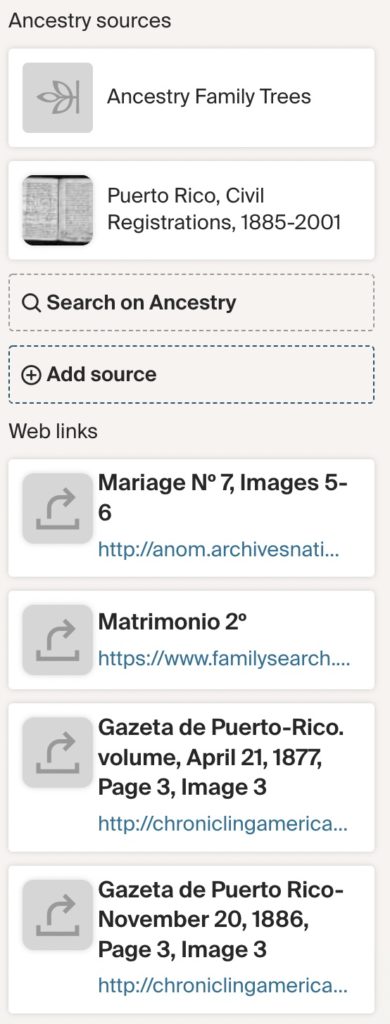Beginning your genealogy journey can be a bit overwhelming. Where do I start? Which branch should I research? I am stuck on an ancestor or have come across a brick wall, help!! These are many of the experiences beginner genealogists experience during their first years researching their tree in hopes of learning more about themselves. The more seasoned you become in genealogy, (sometimes more often than not) the easier it is to find resources, solve your way out of brick walls, and/or learn when to leave a branch alone and ultimately come back to it with fresh eyes – a difficult task for many genealogists, I might add!
In this post I want to suggest five tips for beginner genealogists or those looking to better themselves in this field. Not necessarily with the end goal of becoming a Certified Genealogist, but for those who might like to function closer to a professional level and potentially in a future make some money from this hobby.
1. Ask
When you are starting out, this is probably one of the biggest and simplest things you can do – ASK! Join email groups, Facebook groups, local genealogical groups, etc. to help kickstart your genealogical journey and help you to learn (tip #2). In many of these groups you can ask questions, see interactions between other genealogists, and learn/pick up on different tips. For example, I am a part of various email groups for Puerto Rican genealogy and on Facebook I am a part of various groups for different areas of genealogy that I have helped friends with (Jewish, Czech, German, Italian, for example). This allows me to learn about different sources but also I can easily ask questions on these groups and people are usually more than happy to help.
It was thanks to asking around that I was able to break down my brick wall throw a RAOK (Random Act of Kindness) with the help of a Caribbean genealogist who had better knowledge about Guadeloupe than me at the time.
2. LEArn
This tip is tied to ask (tip #1) and can be understood in different ways (also connected to tip #3). If you plateau in genealogy, various things you can happen or might have happened – you might think there is nowhere else to search or that you have already exhausted all resources for your family tree (especially if you’ve only worked on Ancestry!). Continue to learn about the different sources out there (especially those not online!!). Watch genealogy shows (“Who Do You Think You Are”, “Finding Your Roots”), listen to genealogy podcasts (“ExtremeGenes”, “GenealogyGems”, “Research Like a Pro”), and find related (and even non-related) areas of interest that you can learn from to extend your knowledge about genealogy. This will help give you another perspective with doing your genealogical research and will help you to identify new resources you might be able to use in order to continue working on your family tree.
For example, both the Archivo General de Puerto Rico and the Archivo Diocesano Histórico are not online. So many people might think that the church records and civil records online are the only resources for their families, which is a big misconception! Even books written about families and books about towns’ origins can be helpful in your research and many Puerto Rican churches are still not digitized – which means there are a ton of sources not online that one can still tap into.
Similarly, the field of DNA is becoming more and more popular as a way for genealogists to combine historical paper trails to genetic information about their families to confirm what they have discovered or learn something new about their family. This is a big area that is still growing and so definitely learning about how to use it (if you’re interested) can be super beneficial.
3. study
I separated “study” from “learn” because the way I see it, you can learn about genealogy without having to actually study it. However, if you want to become more serious about your genealogy this is definitely an area to consider.
In the last two years I have taken Boston University’s Online Certificate in Genealogical Research Program and currently I am taking ProGen’s 14 month study group program. As a Puerto Rican genealogist, these programs have been helpful to “up” my overall genealogical knowledge, process, and product though I didn’t learn anything really related to Puerto Rican/Hispanic Research (see how learn and study can be different!). Nonetheless, both programs were super helpful and in the future (closer to when I finish ProGen this spring) I plan to blog about how these programs have helped me to better myself as a genealogist, my weak areas, and how to plan for a potential future in this field (whether professionally and/or certified).
Easily, there are a TON of other programs out there that I have yet to partake in. For example, the Genealogical Research Institute of Pittsburg (GRIP) , GenProof Study Group, Salt Lake Institute of Genealogy (SLIG), and even Excelsior College has offered GENE350: Advanced Genealogical Research. As mentioned before, though you might not learn specific information related to your area of interest, you will still pick up very important skills that will be both useful for yourself and if you ever decide to get clients by studying in these programs.
And trust me that there are many, many more programs out there as well!
4. Organize
Ultimately, as you get more serious about genealogy you need to better your organizational skills. Things like “Oh, I found it online on a tree” or “I’m not sure where this is from” does not cut it in the genealogical world. Citations, citations, citations! Even if you found it on a random website, bookmark it or keep it saved somewhere so you can always go back to it (and even then you will need to cite it as well!). Many times I have beat myself up for not stopping to cite a source or take some quick notes on research I have already done on a certain film on Ancestry or FamilySearch. As a hobbyist, the excitement of researching and finding your ancestors will drive you to want to learn more (and quickly) but you need to set time aside to document your process, what you have discovered, and even what you did not find as well.
In my courses, this is something we have learned, practiced, and are bettering every time an assignment is completed. Especially in the professional genealogical world, you do not want to write a client report and cite other trees as your official source or present information to them with no paper trail or way for them to rediscover/retrace or find the actual documents you have found. Similarly, things come and go on the internet so make sure your source is legit and that the system you have set up works for retracing your steps!
Here’s an example of how I keep track of links on my Ancestry tree – I use web links to track outside resources tied to an ancestor.

5. read
Lastly, remember to keep reading! Whether it’s historical fiction, historical non-fiction, genealogy “how-to” guides, Facebook genealogical posts, genealogical blogs, and anything else in between – remember to keep reading. This will help you to stay up to par with what is out there and again you can continue to learn basically from anywhere! One of my genealogical goals this year is to read five genealogy books – I personally love to read, but sometimes I get sidetracked and have a hard time coming back to genealogy books. However, there are definitely some in my bookshelf I want to get through (especially those related to Puerto Rican genealogy).
I do, however, read about other areas of research since I am fascinated by genealogy overall. Reading has also allowed me to learn about other people in the field doing similar work I do but on a professional level which also allows me to learn about other books they have written or other authors in the same field. For example, I recently posted in my blog about Gísli Pálsson’s book called: The Man Who Stole Himself:The Slave Odyssey of Hans Jonathan. This later lead me to a paper he published with other authors about the use of DNA to trace/reconstruct Hans Jonathan’s maternal DNA via Icelandic descendants which was exciting to read about.
Hopefully some (or all) of these tips have been helpful to some degree! I know there are definitely more razor-sharp specific tips to offer about genealogy and getting better, but I figured I would provide more overarching and general tips since I feel like my blog base is mostly beginner to amateur/hobbyist genealogists.
Feel free to let me know which tip was especially useful for you! Happy Searching!

